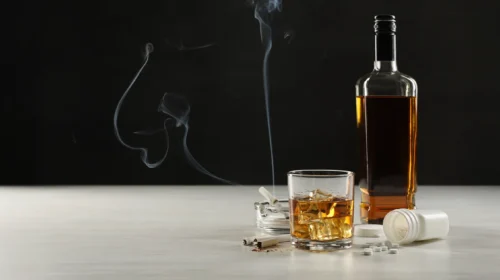The effect of illicit drugs on mental and physical well-being has been thoroughly studied and is well-established in scholarly circles. Even in nonacademic discussions, it’s well understood that illicit drugs will harm your health. What’s less understood is the effect of drugs on your oral hygiene, and specifically, your teeth.
What Do Drugs Do to Your Teeth?
There is evidence to suggest that frequent or long-term use of illicit substances can lead to periodontal disease, loose teeth, more and larger pockets for bacteria in the gumline, and gum swelling. Other evidence also reveals that crack cocaine use can cause oral chemical burns (due to applying to the gums).[1] Meth is commonly associated with severe tooth rot, enamel damage, and tooth breakage or loss.[2]
There are a number of damaging consequences that impact oral hygiene. By extension, this can decrease confidence and self-esteem and prevent some from seeking treatment due to their appearance. Let’s review how various drugs can affect your teeth.
What Ice Does to Your Teeth?
Ice is the street name for crystal methamphetamine. Meth is a highly addictive stimulant that can be smoked, snorted, injected, or taken orally. Over 32,000 overdose deaths were attributed primarily to methamphetamine in 2021.[3]
Even for survivors of meth addiction, ice has many effects on your body, and one of those effects is on your mouth. “Meth mouth” is slang for the oral hygiene of people who suffer from a meth addiction.
Does ice give you cavities? Absolutely.
The teeth of a long-term meth user are often stained, blackened, crumbling, rotting, and/or falling apart. Sufferers are often embarrassed by the condition of their teeth or dentures and try to hide them from people. A study done on the dental disease patterns in meth users found:[4]
- 96% had dental cavities
- 89% had total periodontitis (a combination of mild, moderate, and severe), compared with only 37% of the general US population
- 58% had untreated tooth decay
- Only 23% still had their natural teeth
The main reason meth degrades your oral hygiene is that it impedes saliva production via a condition called “xerostomia.”[5] Saliva is a natural defense mechanism to protect the enamel on your teeth. When that is gone, tooth decay can set in rapidly.
Methamphetamine users are also less likely to consistently practice hygienic practices like brushing their teeth, compared to the general population. This poor dental hygiene is exacerbated by the fact that a common side effect of meth use is the desire for sugary beverages.
On average, a study found that meth users consumed 35.3 soft drinks/month on average, whereas the recommended limit of the American Heart Association is 3 cans/week (12/month).[6] Of meth users, 32.2% reported drinking two or more sodas/day for the last 30 days.[7]
Sugar contributes to the formation of cavities by interacting with plaque on your teeth. When sugar interacts with the plaque, it produces acid. Because meth users don’t have sufficient saliva to protect their enamel and neglect consistent brushing, this acid continues to build up.
As it grows, it will progressively eat away at their teeth and gums over the years. As dental hygiene goes unaddressed and meth use continues, their oral health will continue to decline over time.
Meth mouth is largely irreversible. Treatment for meth mouth focuses on oral hygiene and repair. This could involve teeth extractions, implants, and even dentures.
What Does Crack Do to Your Teeth?
Crack is the street name for “crack cocaine.” It’s the crystallized version of powdered cocaine, which is usually smoked or injected. Over 53,000 overdose deaths were attributed to cocaine and other psychostimulants in 2021.[8]
Survivors of cocaine use will still have to face the damaging effects of the stimulant. This damage can compound with the length of usage, even turning into a condition called “Coke mouth.” This presents enamel erosion, tooth decay, and tooth loss.
There is a statistically significant association between crack usage and dry mouth (i.e., reduced salivary flow).[9] Saliva is a natural defense for protecting your enamel. So, when there is less saliva, there is more opportunity for enamel damage.
The acid produced by the interaction of sugar and plaque can eat into the enamel and gingiva. This can lead to receding gum lines and gingiva pockets–empty space on either side of the tooth–where bacteria can fester.
Cocaine constricts your blood vessels in a process called vasoconstriction.[10] Too much constriction suffocates vessels of oxygen. If this happens frequently enough, the cells will die. Too many cells dying at the same time leads to rot.
Your palate is also at a low but acute risk of rotting. There are several cases of a condition called “Coke mouth,” where a hole forms between the mouth and nasal cavity.[11]
If this perforation is present, a user could take a drink through their mouth, and the liquid could exit through their nose. Food could also pass into the nasal cavity, leading to infections if not removed.
Is Suboxone Bad for Your Teeth?
Suboxone is a prescription medicine used to treat opioid use disorder. It’s a long-acting high-affinity partial agonist that binds to mu-opioid receptors in your brain to prevent you from experiencing euphoric effects from drugs.[12] The idea is that suboxone will break the reinforced association between drug use and pleasure in the user’s mind.
Suboxone has a lower potential for addiction compared to meth and cocaine but still carries a risk of dependence. It’s meant to help curb addiction. It also does not cause either vasoconstriction or desire for sugary beverages as far as has been studied.
However, many patients receiving suboxone have reported dental decay, cavities, loss of teeth, and periodontitis. In 2023, a class action lawsuit against the manufacturer of Suboxone was investigated due to Suboxone-related tooth decay. An advisory committee was established by the state of Rhode Island and a settlement was presented.[13]
This begs the question, can suboxone cause teeth problems? Yes, however, the benefits to overall health outweigh the risks.
While no one has truly admitted fault of any kind, the FDA recently issued an advance warning to people taking oral buprenorphine medications.[14] Buprenorphine is an active ingredient in suboxone.
While the warning doesn’t answer the question of whether suboxone rots your teeth, it does advise people taking Buprenorphine to swish water around in their mouths after the medication has dissolved and then brush their teeth after an hour.[15]
Further research is needed to determine if suboxone is the cause of the patient’s dental problems or, rather if the symptoms indicate the patient’s history of drug usage.
Drug Use and Oral Hygiene
Oral hygiene relates to protecting the health of the mouth[16] which includes the gums, teeth, tongue, lips, hard/soft palates, uvula, tonsils, and cheeks.
There is a well-established link between a lack of oral hygiene, common among those who suffer from substance use disorder, and cardiovascular disease (CVD). In a research study, 84.4% of patients with CVD had co-occurring periodontal disease, whereas only 22.5% of patients without CVD also had periodontal disease.[17]
Losing teeth is also a health risk for atherosclerotic cardiovascular diseases (ACVD).[18] ACVD is a disease where arteries that carry blood to the heart begin to fill up with plaque. If this plaque dislodges, it can travel to the heart and block blood flow. If your brain goes long enough without oxygenated blood, you will die.
Addressing the effects of drugs on oral health is a key aspect of overall health management in substance abuse recovery
Seeking professional help is the best way to treat and overcome the effects of substance abuse on your body. Recovery Unplugged is here to provide compassionate support and evidence-based treatment to address your whole-body wellness in recovery. Call today and let’s take the journey together.
Sources:
- [1]Quaranta, A., D’Isidoro, O., Piattelli, A., Hui, W. L., & Perrotti, V. (2022, October). Illegal drugs and periodontal conditions. Periodontology 2000. https://www.ncbi.nlm.nih.gov/pmc/articles/PMC9828249/
- [2]Methamphetamine. American Dental Association. (n.d.). https://www.ada.org/en/resources/research/science-and-research-institute/oral-health-topics/methamphetamine
- [3][8] U.S. Department of Health and Human Services. (2023, July 10). Drug overdose death rates. National Institutes of Health. https://nida.nih.gov/research-topics/trends-statistics/overdose-death-rates
- [4] Shetty, V., Harrell, L., Murphy, D. A., Vitero, S., Gutierrez, A., Belin, T. R., Dye, B. A., & Spolsky, V. W. (2015, December). Dental disease patterns in methamphetamine users: Findings in a large urban sample. Journal of the American Dental Association (1939). https://www.ncbi.nlm.nih.gov/pmc/articles/PMC5364727/
- [5] Saini T;Edwards PC;Kimmes NS;Carroll LR;Shaner JW;Dowd FJ; (n.d.). Etiology of xerostomia and dental caries among methamphetamine abusers. Oral health & preventive dentistry. https://pubmed.ncbi.nlm.nih.gov/16355653/
- [6][7] Murphy, D. A., Harrell, L., Fintzy, R., Vitero, S., Gutierrez, A., & Shetty, V. (2016). Soda consumption among methamphetamine users in the USA: Impact on oral health. Oral health & preventive dentistry. https://www.ncbi.nlm.nih.gov/pmc/articles/PMC4892989/
- [9] Antoniazzi RP;Sari AR;Casarin M;Moraes CMB;Feldens CA; (n.d.). Association between crack cocaine use and reduced salivary flow. Brazilian oral research. https://pubmed.ncbi.nlm.nih.gov/28591239/
- [10] U.S. Department of Health and Human Services. (2022, December 19). Cocaine drugfacts. National Institutes of Health. https://nida.nih.gov/publications/drugfacts/cocaine
- [11] Barrientos, J., Corchero, G., & Soler, F. (2021, February 1). Surgical treatment of cocaine-induced palatal perforations: Report of three cases and literature review. Journal of clinical and experimental dentistry. https://www.ncbi.nlm.nih.gov/pmc/articles/PMC7864366/
- [12] Velander, J. R. (2018). Suboxone: Rationale, science, misconceptions. The Ochsner journal. https://www.ncbi.nlm.nih.gov/pmc/articles/PMC5855417/
- [13]State of Rhode Island Executive Office of Health and Human Services 6 … (n.d.). https://eohhs.ri.gov/sites/g/files/xkgbur226/files/2021-06/21-000X_Notice%20to%20Public_Home%20Care_6.22.21%20web.pdf
- [14][15] Center for Drug Evaluation and Research. (n.d.). Buprenorphine dissolved in the mouth can cause dental problems. U.S. Food and Drug Administration. https://www.fda.gov/drugs/drug-safety-and-availability/fda-warns-about-dental-problems-buprenorphine-medicines-dissolved-mouth-treat-opioid-use-disorder
- [16] U.S. Department of Health and Human Services. (n.d.). Oral Hygiene. National Institute of Dental and Craniofacial Research. https://www.nidcr.nih.gov/health-info/oral-hygiene
- [17] Najafipour, H., Malek Mohammadi, T., Rahim, F., Haghdoost, A. A., Shadkam, M., & Afshari, M. (2013, July 9). Association of Oral Health and Cardiovascular Disease Risk factors “results from a Community-Based Study on 5900 adult subjects.” ISRN cardiology. https://www.ncbi.nlm.nih.gov/pmc/articles/PMC3727197/
- [18] Beukers NGFM;Su N;Loos BG;van der Heijden GJMG; (n.d.). Lower number of teeth is related to higher risks for ACVD and death-systematic review and meta-analyses of Survival Data. Frontiers in cardiovascular medicine. https://pubmed.ncbi.nlm.nih.gov/34026863/

























